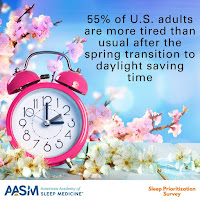March 12, 2020

On Sunday morning many Americans had to“spring forward,” turning the clock ahead an hour for daylight saving time. Unfortunately, according to an official Health Advisory by our client the American Academy of Sleep Medicine (AASM), studies show that moving into or out of daylight saving time has adverse effects on sleep/wake patterns that can last five to seven days. And a recent survey we conducted with theAASM showed that 55% of U.S. adults felt more tired than usual after the spring time change.
In light of these findings, LCWA crafted a press release which detailed the health and safety dangers of the daylight-saving time transition, highlighting thisstatistic and studies showing other negative health impacts. We conducted outreach to targeted national media outlets, resulting in great media coverage. Read all about it in this article in Wall Street Journal and this article from Refinery29.
